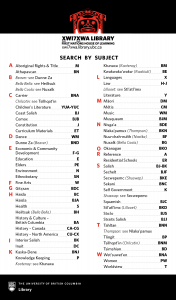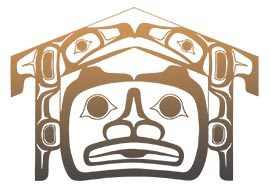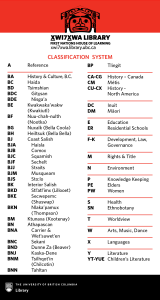X̱wi7x̱wa Library uses a locally developed classification and subject heading system to organize material in the collection. Materials are catalogued and discoverable on the UBC Library Catalogue. Select “Xwi7xwa Library” as a location filter using the “Branch Location” dropdown menu to limit search results to items at Xwi7xwa Library.
For more information about Indigenous Knowledge Organization, see the Indigenous Knowledge Organization section of X̱wi7x̱wa Library’s Indigenous Librarianship research guide.
For libraries seeking resources for implementation, see the information under For Libraries on this page.
Classification System
A library’s classification system determines an item’s physical location on the shelf. Each item in the library is assigned to one general “class” of knowledge in the classification system. Items of the same class or similar classes are shelved together. The classification is indicated by a call number, usually placed on the outside of an item (e.g. a label on a book’s spine).
X̱wi7x̱wa Library uses a British Columbia variant of the Brian Deer Classification System, developed by Kahnawake librarian Brian Deer in the 1970s for the National Indian Brotherhood (now the Assembly of First Nations). To learn more about Brian Deer, this article by Jean Weihs was published in tribute to him shortly after he died in 2019. You might also check out the Indigenous Librarianship LibGuide for additional resources about the classification system.
X̱wi7x̱wa Library’s modified Brian Deer Classification System was developed by founding librarian Gene Joseph (Wet’suwet’en – Nadleh Whut’en).
To learn more about how items at X̱wi7x̱wa Library are classified, watch this short video:
For Libraries
For libraries looking for information on how to implement a Brian Deer Classification System, you should first understand that Xwi7xwa’s scheme is one example of what works in this library and for our audiences. Each implementation is unique and has to take both the library and its audiences into consideration. We are not currently accepting tours and/or meetings about our Classification system.
Resources for Implementation
There are existing resources where institutions have written about implementing Brian Deer for their collections and audiences. Key readings are highlighted below:
- Indigenization of Knowledge Organization at the Xwi7xwa Library (2015) by Ann M. Doyle, Kimberley Lawson, Sarah Dupont
- Adapting the Brian Deer Classification System for Aanischaaukamikw Cree Cultural Institute (2015) by Reagan Swanson
- Implementing the Brian Deer Classification Scheme for Aanischaaukamikw Cree Cultural Institute (2017) by Annie Bosum and Ashley Dunne
- A Case Study in Indigenous Classification: Revisiting and Reviving the Brian Deer Scheme (2015) by Alissa Cherry and Keshav Mukunda
There are several publicly accessible versions of a Brian Deer system which can be used as a starting point for modification:
- BC Variant of Brian Deer for Xwi7xwa Library
- SFU Indigenous Curriculum Resource Centre Classification System available via the ICRC’s Brian Deer Classification Page
- KPU χʷəχʷéy̓əm Indigenous Collection Classification Scheme
- UBCIC Resource Centre Revision of Brian Deer
For more information, including scholarly articles on Indigenous Knowledge Organization, see our Indigenous Librarianship LibGuide. This includes topics on Indigenous Libraries and Digital Collections, Indigenous Knowledge Organization, and the Brian Deer Classification System.
Subject Headings
 Subject headings are used to describe the topic(s) or subject(s) of a library item, and an item may be assigned several subject headings. A subject heading is a term selected from a controlled vocabulary (similar to a dictionary or thesaurus). Subject headings can be useful for online catalogue browsing and searching by topic, but they have no relation to a library item’s location on the shelves. The most common are the Library of Congress Subject Headings (LCSH).
Subject headings are used to describe the topic(s) or subject(s) of a library item, and an item may be assigned several subject headings. A subject heading is a term selected from a controlled vocabulary (similar to a dictionary or thesaurus). Subject headings can be useful for online catalogue browsing and searching by topic, but they have no relation to a library item’s location on the shelves. The most common are the Library of Congress Subject Headings (LCSH).
X̱wi7x̱wa Library uses First Nations House of Learning (FNHL) subject headings developed at UBC in an effort to better reflect Indigenous Peoples’ self-identities, modes of understanding, and traditional knowledge. The FNHL controlled vocabulary is currently in development. FNHL subject headings follow a standard order of [topic]-[subtopic]-[place]-[chronology].
For example: Indigenous Peoples–Hunting rights–Law and legislation.
X̱wi7x̱wa Library’s Names for BC First Nations in BC list will continue to be expanded and revised to best reflect the preferences of First Nations.

